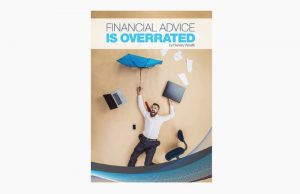If you’re about to embark on your wealth creation journey, you may be wondering what you should aim for first.
Here’s my advice: aim for nothing.
Huh?
Let me explain.
When I say ‘aim for nothing’ I mean you should aim for owing nothing and owning nothing. Sounds easy, doesn’t it? In fact, you may think you’re already ahead of the game because of the equity in your house.
Unfortunately, thinking of your home as an investment asset is a false economy. Granted your home gives you a lot of benefits—shelter, a place to raise a family, security, and a place to create wonderful memories. But it doesn’t give you an income stream, help you travel, put your kids through school or set you up for retirement.
In fact, when you think of the money you have to spend on maintaining and repairing it, renovations, utilities and rates, it’s more a liability than an asset.
When you think of your home as an asset, you can easily get trapped by what’s known as ‘the wealth effect’. You think your home is increasing in value, and so your comfort in buying depreciating assets such as cars and household consumables also increases.
(It seems to be quite a problem in Sydney, where both spending and property prices continue to climb at a phenomenal rate.)
The problem with this line of thought is that while you’re spending real money, your house is potential wealth that hasn’t actually been realised. You’re only locking in the side of the equation that takes you backwards, and you have no idea when you’ll have the money to pay the bills.
Bank loans — “It’s a trap!”
Most bank loans have a 30-year payment period. Why? Because the longer the bank has you trapped on that repayment treadmill, the more interest you’ll have to pay them.
Let’s say you borrow $750,000 loan at 7.5%, and make monthly payments. By the time those 30 years are up you’ll have paid $1,137,880 in interest. That’s over 50% more than the amount you borrowed to start with.

But if you switched to weekly repayments, and could somehow pay off an extra $250 each week, you’d reduce the loan term to just under 16 years and save yourself $608,985 in interest—a guaranteed return.
(Here at Plenary Wealth we to try to give our clients their ‘happily ever after’ by having them debt-free by the time they’re 50. That gives us 15 years to focus on building up their retirement assets.)
So how do you avoid falling into ‘the wealth effect’ trap? By ignoring the equity in your home, and focusing on your debt and getting to the zero line.
Work out if, excluding the value of your home, your investment assets have more value than what you owe. If not, then every dollar you spend is putting you further into debt and away from the point where you can actually make money and accumulate wealth.

So does this mean you should stop spending your money altogether? No. You obviously still need to buy the essentials. And it’s important to revel in your successes and reward yourself once in a while.
But you need to avoid getting caught in ‘the wealth effect’ trap by planning ahead and setting limits to stop the subconscious negative behaviours.
Ready to embark on your wealth creation journey? Then get in touch with us today so we can help you reach your destination sooner.



